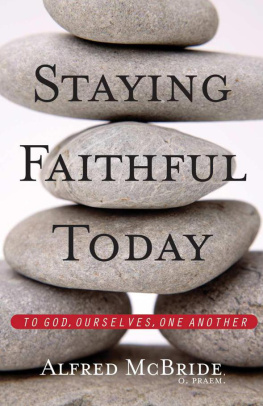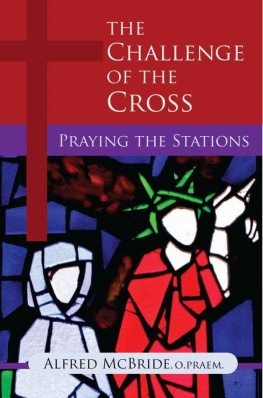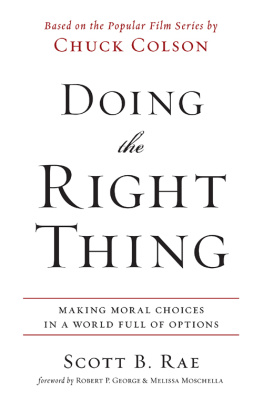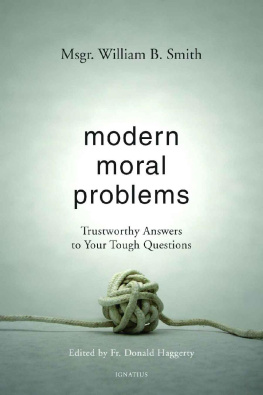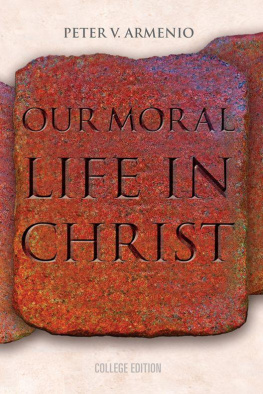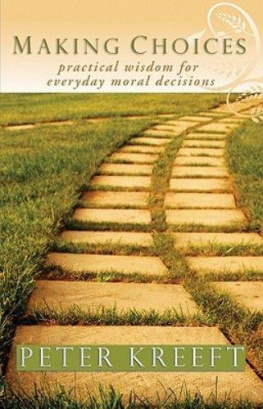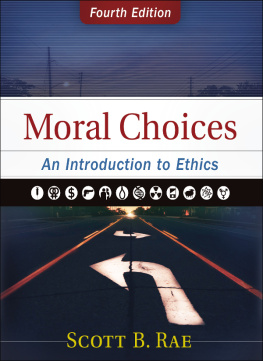Table of Contents
RESCRIPT
In accord with the Code of Canon Law, I hereby grant my permission to publish Christ Our Compass: Making Moral Choices, by Alfred McBride, O.PRAEM.
Most Reverend Joseph R. Binzer
Auxiliary Bishop
Vicar General
Archdiocese of Cincinnati
Cincinnati, Ohio
December 3, 2013
The Imprimatur (Permission to Publish) is a declaration that a book or pamphlet is considered to be free from doctrinal or moral error. It is not implied that those who have granted the Imprimatur agree with the contents, opinions or statements expressed.
Cover and book design by Mark Sullivan
Cover image Irina Tischenko | PhotoXpress
Scripture passages have been taken from New Revised Standard Version Bible, copyright 1989 by the Division of Christian Education of the National Council of the Churches of Christ in the U.S.A., and used by permission. All rights reserved.
Library of Congress Cataloging-in-Publication Data
McBride, Alfred.
Christ, our compass : making moral choices / Alfred McBride, O.PRAEM.
pages cm
Includes bibliographical references and index.
ISBN 978-1-61636-711-4 ( alk. paper)
1. Christian ethicsCatholic authors. I. Title.
BJ1249.M145 2013
241.042 dc23
2013041398
ISBN 978-1-61636-711-4
Copyright 2014, Alfred P. McBride, O.PRAEM. All rights reserved.
Published by Franciscan Media
28 W. Liberty St.
Cincinnati, OH 45202
www.FranciscanMedia.org
Introduction
When people speak ill of you, so live that nobody will believe them.
Plato, The Republic
T hroughout this book, we will examine moral living through the lens of Life in Christ, the third part of the Catechism of the Catholic Church . There are two sections in Life in Christ. Section One considers the basics of the moral life, such as Christs laws of love, the role of Gods grace, the reality of sin and its forgiveness, and the power of happiness as a motive for Christian living. That section is the foundation for Section Two, which explores the meaning of the Ten Commandments and the path to holiness they describe.
Following the pattern in the two sections of Life in Christ, Christ, Our Compass will devote four chapters to the basics of Christian living and eight to the application of the Ten Commandments to our daily lives. Each chapter will highlight three things that the Catechism asks us to do.
In chapter one, I will show three ways in which the Catechism s teaching on grace helps us be moral. First, the Catechism asks us to answer Gods call to a love relationship. Second, we are asked to become who we area new creation. Third, the Catechism asks us to let the joy of Jesus motivate us to be moral. The role of love and the fruit of joy compose the horizon of living the Catechism . Without a love relationship with Christ, we will have no passion in our faith life. Without a feeling of deep joy we will not understand the moral life.
The commandments describe goals of love that respond to the gracious gift of salvation from Jesus. They are more than legal rules. They are invitations from Christ to live our faith and to receive the powers of grace in the sacraments. There is yet a further step: living the Catechism by loving others graciously, generously, enthusiastically.
We all want happiness. Loving God and people, especially those in need, is a sure fire road to joy. The moral life is not meant to depress us; it is geared to authentic personal satisfaction.
Yet it may seem odd to add that such love of God and people includes the way of the cross. That is why we speak of sacrificial love. It is a myth to think the road of love contains no difficulties, problems, disappointments, or tragedies. Jesus, Son of God and son of Mary, loved us with all his heart, yet knew many trials. Living the part of the Catechism that deals with the moral life is grounded in these preliminary thoughts.
The structure of this book is composed of two parts. The first section describes the fundamental principles of our moral life. This is covered in our first three chapters. By beginning with Gods grace and the joy of what true morality means, we have the highest possible means for the journey to goodness.
By then reflecting on the gift of the Church as our Mother and Teacher, we obtain the profound confidence we will need as we embark on the adventure of holiness. Jesus gave us the Church as a maternal source of his graces and wisdom. Jesus gave us the Church to discern the truths imparted to us in Scripture and Tradition, celebrated by us in the sacraments and enlightened by us in our prayer life.
By offering us a perfectly clear understanding of the reality of sin and evil, the Catechism lifts us out of a culture that prefers to counsel us to forget this truth. A failure to admit our sinfulness causes us to flee from reality, to misunderstand the purpose of Chriss salvation, and to be committed to a life shorn of true love and steady joy.
The second section of this book applies the principles just mentioned to practical ways we can live them everyday. In the nine chapters that follow, we develop the gifts of the moral life through guidance from the Ten Commandments. We base this interpretation on Christs two greatest commandments as found in the Gospels.
Teacher, which commandment in the law is the greatest? He said to him, You shall love the Lord your God with all your heart, and with all your soul, and with all your mind. This is the greatest and first commandment. And a second is like it: You shall love your neighbor as yourself. (Matthew 22:3639)
Chapter four of this book calls us to love God as stated in commandments one and two. Chapter five asks us to reclaim the Sabbath, as we read in commandment three.
Chapters six through twelve emphasize the love of neighbor in family life, marriage, sexuality, war and peace, justice, commitment to truth, and the role of virtues in helping us to live these teachings. Of course the love of God and power of Gods abundant spiritual graces remain an essential component of our coping with these challenges.
We also view the journey as our growth in holiness. We hear the call of our loving Father. We experience affection of Christ, who stands at the door of our hearts with the promise of walking with us. We are assured of the presence of the Holy Spirit, who gives us many gifts to be our light and the source of energy in our progress.
Generally each chapter contains a number of illustrations to make a point, and concludes with reflection questions to assist you on your path to God. It would be helpful, but not necessary, to have a copy of the Catechism handy as you read through this book.
I trust this text will invite you into Gods presence and pray you will feel Gods love for you increase in your faith journey.
Chapter One: Amazing Grace, What Joy It Brings!
C .S. Lewis is one of the most widely read religious writers in the English-speaking world. Born in Northern Ireland, he was taught to say his prayers and go to church, but he was not particularly interested in religion. He abandoned religion altogether during his student years at Oxford.
What drew him back to God? Lewis explained the experience in his book Surprised by Joy . It was a series of bursts of happiness that pulled him to God. He said a door to joy would open for a moment, then close again. It left him with an inner longing for something or someone.
One night while he sat alone in his room at Magdalene College in Oxford, God lovingly took hold of him: You must picture me alone in that room in Magdalene, feeling the steady, unrelenting approach of him whom I desired earnestly not to meet. In the Trinity term of 1929 I gave in, and admitted that God was God, and knelt and prayed: perhaps, that night, the most dejected and reluctant convert in all England. Moved by Gods love and grace, Lewis became one of Christianitys most eloquent apologists.


